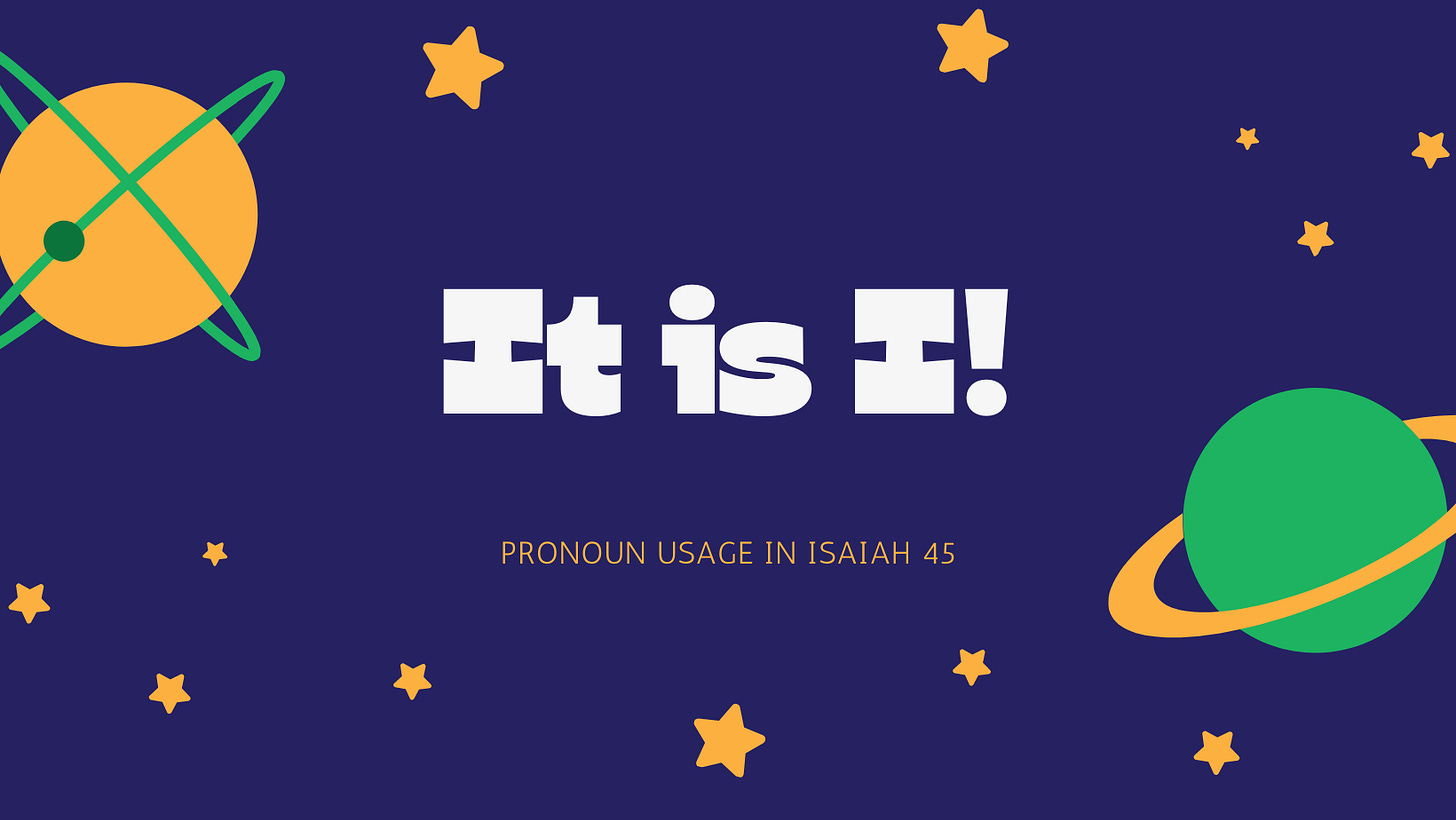It is I!
Pronoun usage in Isaiah 45
This post is a bit more technical than usual, but I discuss some skillful poetic features of Isaiah and what that means for interpretation. If the grammar portion too much for you, you can skip to the second half and still get the gist.
Basic Hebrew for the non-linguist
First, three basic facts about Hebrew for some background information.
1. Hebrew has verb conjugations with gender, number, and person.
From the verb alone, you can tell the gender, number, and person of the subject. Many of you have studied Spanish, which also has verbal affixes (think corro, corres, corre).
שמעתם
שמעתם
listen.2.m.pl
‘you listened’
For the examples, remember that Hebrew is read right-to-left.
2. Hebrew is a pronoun drop language.
Just like in Spanish, there is no need to repeat a pronoun in the text because the verb supplies the information.
.יוסף הלך לבית פרעה. פעל קשה
Joseph go.3.m.sg to-house.of Pharaoh. Work.3.m.sg hard.
‘Joseph went to Pharaoh's house. He worked hard.’
In the second sentence, Hebrew does not require the pronoun “he.” You can drop the pronoun, and readers will know what the subject is.
Basic grammar stuff. Now, for some more interesting stuff.
3. Pronouns can be used for emphasis.
When pronouns are used in places where they aren't strictly necessary, then there is special emphasis. In these cases, pronoun usage is a stylistic, semantic and pragmatic choice. It is marked.
יוסף הלך לבית פרעה. הוא פעל קשה
Joseph go.3.m.sg to-house.of Pharaoh. He work.3.m.sg hard.
‘Joseph went to Pharaoh's house. It is he who worked hard.’
In the above example, the emphasis pronoun is in bold. In English, a translation for emphasis pronouns might be “It is he” rather than just “he.”
Case study: Pronouns in Isaiah 45:12
The special, emphatic, marked usage of the 1st person singular pronoun, I (ani/אני), is prevalent in Isaiah 45 more than anywhere else in the book. Brief background: the first half of Isaiah is mostly judgement and despair. Then, the second half of Isaiah is about hope and deliverance. Our passage, Isaiah 45, is found in the second half. Let’s take a look at just one verse to illustrate special pronoun usage, Isaiah 45:12:
אָֽנֹכִי֙ עָשִׂ֣יתִי אֶ֔רֶץ
I made.1.sg earth
‘It is I, I made the earth’
וְאָדָ֖ם עָלֶ֣יהָ בָרָ֑אתִי
and-man upon-it created.1.m.sg
‘and man upon it I created’
אֲנִ֗י יָדַי֙ נָט֣וּ שָׁמַ֔יִם
I my hands stretch.out.3.pl heavens
‘It is I, my hands stretched out the heavens’
וְכָל־ צְבָאָ֖ם צִוֵּֽיתִי׃
and-all host-their command.1.sg
‘and all their host I commanded’
The marked usage of the first person pronoun is in bold, seen in the first and third versets. Note that it is very unusual to see the first person pronoun “I” used so frequently.
Parallelism within the verse
Note the beautiful, textbook example of parallelism in the verse.
A - I, I made the earth
B - and man upon it I created
A - I, my hands stretched out the heavens
B - and all their host I commanded
The A versets have the marked, emphatic “I.” The B versets have bare conjugated verbs. The versets are also parallel in word order: A versets are Pronoun Verb Object, and B versets are Object Verb.
Another textbook feature of parallelism is the escalation in the verse. In Hebrew poetry, the second half builds on the first half and heightens it. In the first AB set, we have earth and man. Then, the poet zooms out to the wider universe, to the heavens and all the stars—an escalation of scale.
Ego check: pronoun usage in Isaiah 45 vs. Isaiah 14
Interestingly, the focus on the first person “I” in Isaiah 45 is stronger even than in Isaiah 14, which narrates Assyria's pride and ego:
I will ascend to the heavens;
I will raise my throne
above the stars of God;
I will sit enthroned on the mount of assembly,
on the utmost heights of Mount Zaphon.
I will ascend above the tops of the clouds;
I will make myself like the Most High.
Some commentators point to Isaiah 14’s repetition of “I” as proof that Isaiah 14 is about Satan and his ego. It’s true that the repetition of “I” is obvious in English. The self-focus is clear. Yet, in Hebrew, there isn't that same emphasis on the first person. In Hebrew, not a single instance of the marked “I” pronoun is present in this passage. In fact, you could even translate this passage with less “I,” and it would technically be a more literal translation.
So, Isaiah 14 is clearly about Assyria’s ego, but not to the extent where the passage is literally, “me, me, me!” But, in Isaiah 45, our creator does literally say, “I, I, I!”
Why are all these pronouns in Isaiah 45?
By emphasizing “I” in Isaiah 45, Yahweh says, “This is me, I am creator, I am salvation.” The focus is on Yahweh, the emphasis is on Yahweh. He echoes his name: the Great “I Am.”
Yahweh emphasizes himself even more so than the selfish pride of Assyria. Yahweh's zeal for himself is stronger than man's ego. God's emphasis on himself is worth pondering.
Glossary
1 - 1st person
2 - 2nd person
3 - 3rd person
m - male
sg - singular
pl - plural


